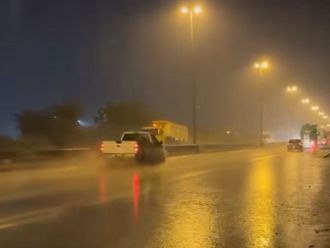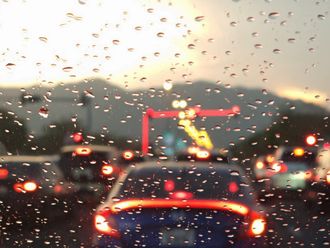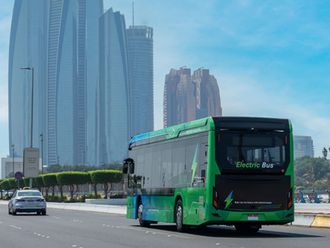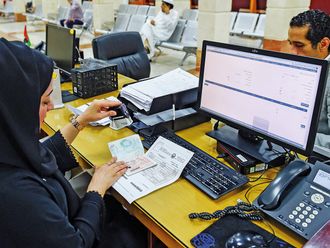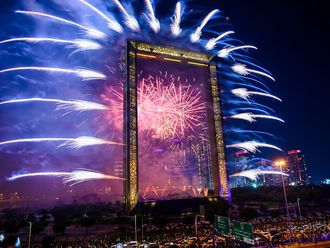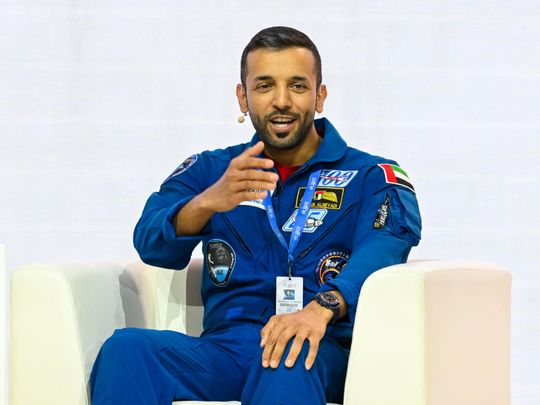
Dubai: Getting a handwritten message from his mother, who had never gone to school, was the “best thing” he received in space, UAE astronaut Dr Sultan Al Neyadi revealed on Wednesday.
The Emirati astronaut, who created history twice by completing the longest Arab space mission and by becoming the first Arab spacewalker, was addressing the 21st Arab Media Forum, the region’s largest annual gathering of media, in Dubai.
This was his first public appearance in Dubai after his return to the UAE earlier this month following his space mission onboard the International Space Station (ISS).
The UAE’ space hero was accorded thunderous applause before, during and after his session titled ‘From the Desert to the Stars’ at the main stage of the region’s largest annual media gathering, which concluded on Wednesday.
In attendance in the packed hall was Sheikh Ahmed bin Mohammed bin Rashid Al Maktoum, Second Deputy Ruler of Dubai and Chairman of the Dubai Media Council along with other senior officials.
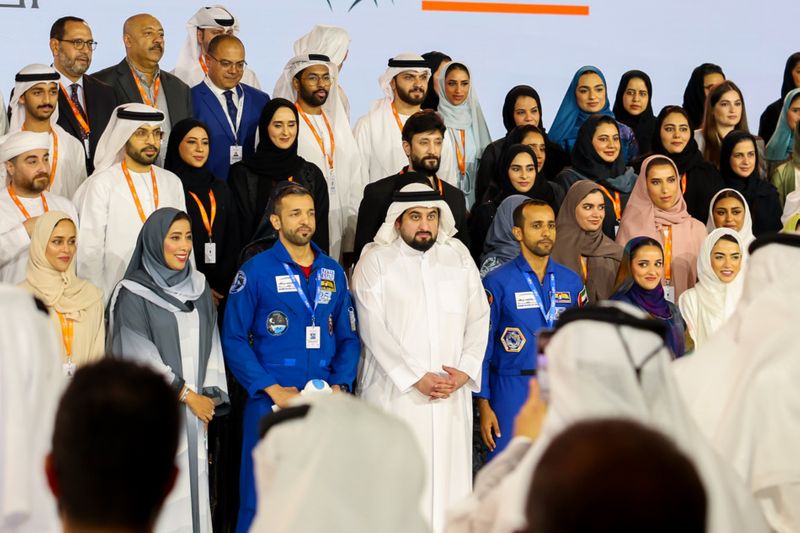
During the session, Al Neyadi recalled his journey from the unpolluted desert town of Umm Ghafa in Al Ain to seeing the Milky Way from space - just as he had wished in his childhood.
Grateful to parents
He credited his parents for all that he has achieved in his life and thanked them for raising their children with values in life even though his parents were not highly educated.
“I thank my father and my mother, they deserve all the credit... They taught us the values of faith, science and principles that we have to hold dear in life,” Al Neyadi said.
He went on to share an anecdote from his six-month-long space odyssey aboard the ISS. “My mother never went to school, and my father did not complete his education and joined the military service early,” he recalled.
“After we graduated, my mother studied by herself. She learned to read and write and memorised the Quran. The best thing I received on the International Space Station was a hand-written message from my mother,” he said to a loud round of applause from the audience.
He added that his mother wished him success and conveyed that the entire country was proud of him and so was she.
Family bonds
During his space mission, Al Neyadi had expressed his longing to have food cooked by his mother. He always spoke about his father as his biggest inspiration and often mentioned how he cherished his family bonds.
Al Neyadi also recounted the happy moments of reuniting with his children when he landed in Abu Dhabi to receive a hero’s welcome from the country’s leaders and hundreds of people including senior officials on September 18.
Asked about his sons’ future ambitions, the 42-year-old father-of-six said: “One wants to become a professional diver, one a football star and another one wants to be a mechanic,” he said, with a gesture of repairing things, sending a ripple of laughter among the audience.
Next stop, the Moon?
Speaking about his own ambition going forward, he said he had told Salem Humaid Al Amiri, director of the Mohammed Bin Rashid Space Centre (MBRSC) - the agency behind the UAE Astronaut Programme - that “we should go to the Moon next”, soon after his re-entry to Earth.
“It is not just me. We mean, all of us. Sultan, Hazzaa and everyone.”
He was referring to Hazzaa Al Mansoori, the UAE’s first astronaut to go to space exactly four years ago, who was also present in the audience, as well as the two other UAE astronauts who are currently undergoing training for future space missions.
Al Neyadi pointed out that UAE space programme is sustainable and ongoing.
Referring to President His Highness Sheikh Mohammed bin Zayed Al Nahyan, he said: “Abu Khaled always supported us. He knew the importance of our work. It was not just for the sake of creating an event. It was for all the Emiratis.”
“The ambition of our leadership in this sector is great. Our leadership is planning things beyond the second and third mission,” he said, and recalled how His Highness Sheikh Mohammed bin Rashid Al Maktoum, Vice and President and Prime Minister of the UAE and Ruler of Dubai had envisioned future space missions by the country.
“Our youth has a great opportunity and they must be prepared to undertake these missions... Our mission also has an Arab dimension, as our region was previously a cultural beacon in Damascus and Baghdad and Egypt.”
Learning and education—that is the only secret to attaining achievements and bringing back the past glory of the region, he said.
One nation, one team
The nation’s pride also expressed his pride in having the support of the entire country for his achievement. “The Emirati nation worked as one team and stands behind my achievement,” he said.
“We are working with the ambition of the UAE’s Founding Father, the late Sheikh Zayed bin Sultan Al Nahyan and we are all looking forward to giving back to our country. The forefathers have worked hard for this generation that is reaping the benefits of their hard work. It is time for the Emirati youth to give back to their country.”
He said every citizen who proudly bears the title of an Emirati receives what he or she deserves. “When you work hard, you will get what you deserve as Emirati citizens. We always say space is different. But we have sports, and various other fields also where you have to represent our nation.”
Al Neyadi pointed out that the UAE has made a strong imprint in the field of space science with our astronauts, satellites, and the Hope probe to Mars. “We enjoy credibility and trust in our capabilities and we have proven ourselves.”
He pointed out that space missions never happen overnight. “They require extensive planning and training, and we trained on all the aspects to ensure that the mission was completed in an optimal manner.”
“I was living every moment and I am proud that I did not commit any mistakes.”
He said he had never felt lonely during his life aboard the International Space Station as he was always kept busy with scientific missions, experiments, and documenting Earth observations with photography and videography.
“We are trained to deal with the sense of loneliness [when you live away from Earth]. We are trained to deal with astronauts of different regions and female astronauts and to deal with life in a closed space where a conflict may arise.
“I learned from the space station to present scientific material in simple language. I used to wonder how media people shared a lot of content in short videos. But, I also managed to simplify scientific things in simplified in Arabic through my videos.”



